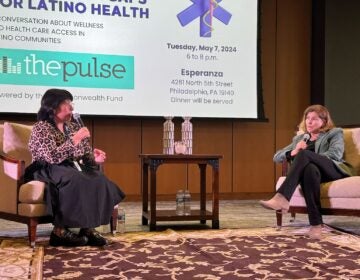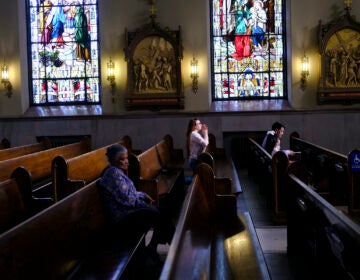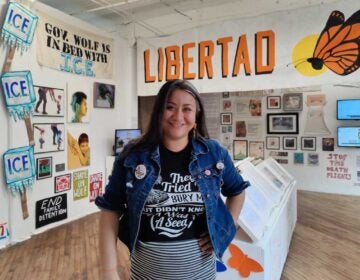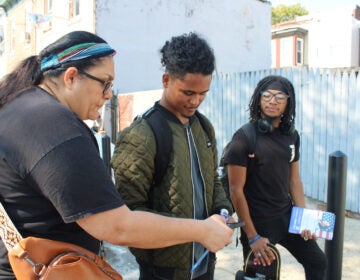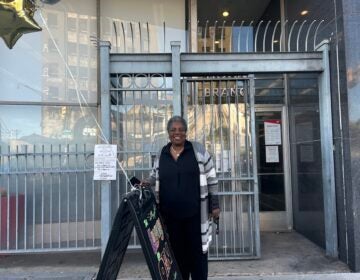6 key takeaways from the latest poll on Latino voters in battleground states
More than 70% of Latino voters in battleground states plan to vote in this election, according to the survey.
Listen 1:13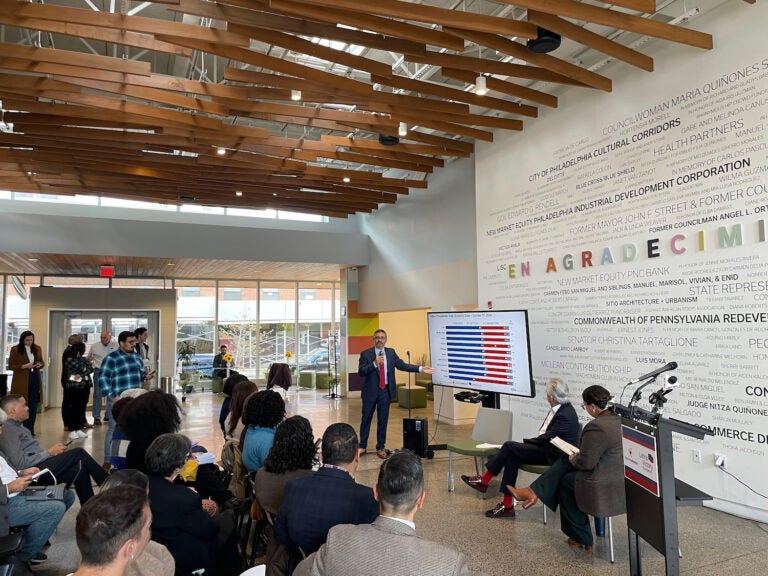
The Hispanic Federation and the Latino Victory Foundation unveiled the results of a recent poll of Latino voters in battleground states at Taller Puertorriqueño in North Philadelphia on October 15, 2024. (Emily Neil/WHYY)
What questions do you have about the 2024 elections? What major issues do you want candidates to address? Let us know.
On Tuesday, The Hispanic Federation and the Latino Victory Foundation gathered at Taller Puertorriqueño in North Philadelphia to unveil findings from a national poll of Latino voters in battleground states.
“It is our hope that with this poll, we reframe the way that Latino voter power is perceived, both nationally and at the state level,” said Frankie Miranda, president and CEO of the Hispanic Federation. “But most importantly, that we tell our own story, that we help our own community to get to the polls.”
California-based BSP Research conducted the poll from Oct. 2 to Oct. 10, surveying 1,900 Latino voters in Arizona, Georgia, Michigan, Nevada, North Carolina and Pennsylvania. Poll researchers said the survey was done in multiple formats in Spanish and English to include a wide representation of Latino voters with different backgrounds.
Here are six key takeaways from the poll results and what it says about the Latino vote in Pennsylvania.
1. Latino voters can make the difference — especially in Pa.
There are an estimated 580,000 Latino voters in the Keystone state — more than seven times the margin of victory in Pennsylvania in the 2020 presidential election.
“The difference now is that elections are so close and Latinos now have dispersed throughout the country,” said Luis A. Miranda Jr., chair of Latino Victory. Miranda, a Democratic political strategist and the father of “Hamilton” creator Lin-Manuel Miranda, explained that campaigns are now focusing on Latino voters in Pennsylvania, Georgia and North Carolina, where the margins of victory are small, rather than Latino voters in cities such as New York.
“The road to the White House comes through Pennsylvania Latino barrios,” he said.
Across the country, there are around 36.2 million Latino eligible voters this election cycle. According to the Pew Research Center, Latino voters will make up close to 15% of the national electorate, a record high.
More than 70% of Latino voters in battleground states plan to vote in this election, according to the survey.
2. Campaigns are reaching out to more Latino voters
The poll found that 64% of Latino voters in battleground states have been contacted about the upcoming election by a political party or campaign, or a nonpartisan voter registration organization. More than a third, 36%, said they have not been contacted at all.
In Pennsylvania, 80% of Latino voters strongly agreed or somewhat agreed with the statement, “Candidates are making an effort to reach out to me and ask for my vote.” That was the highest percentage of any of the battleground states, indicating the extensive campaign outreach to Latino voters in Pennsylvania — “probably now the most important Latino state,” according to Matt Barreto, founding partner and president of BSP Research.
3. On top issues, Latino voters are supportive of progressive policies
Latino voters surveyed cared the most about inflation and the cost of living, according to the findings, with 60% citing it as a top issue. Jobs and the economy and housing costs and affordability ranked second and third, at 38% and 32%, respectively.
A majority of Latino voters surveyed supported more progressive policies, including passing a law to guarantee abortion access, creating a pathway to citizenship for undocumented immigrants living in the U.S., passing regulations on pollution to mitigate climate change, implementing gun control measures and more.
4. Vice President Kamala Harris becoming the Democratic candidate energized Latino voters
The poll found that 60% of Latino voters became more interested in the presidential election after Vice President Kamala Harris replaced President Joe Biden as the Democratic presidential candidate.
“We’re seeing that on the ground in the work that the community organizations are doing and the phone calls we’re making,” Barreto said. “In particular, young people, 18 to 29, 65% say that they’re now more interested in the election since Kamala Harris became the nominee.”
5. Harris, Dems lead among Latino voters in Pa., other key battleground states
In battleground states overall, 62% of Latino voters plan to vote for Harris, versus 34% who plan to vote for former President Donald Trump.
In Pennsylvania, the margin of victory is slightly bigger, with 64% of Latino voters planning to vote for Harris, versus 31% who said they will cast a ballot for Trump.
In congressional races, the percentage of undecided voters increases across the battleground states, but Democrats still lead. In Pennsylvania, 57% of Latino voters said they will vote for Democratic congressional candidates, versus 26% who plan to vote for Republican congressional candidates.
6. Community organizations, nonprofits are engaging Latino voters on the ground
Frankie Miranda of the Hispanic Federation said the national organization has been collaborating with a number of local nonprofits and community-based organizations to conduct nonpartisan voter outreach in Latino communities across Pennsylvania and other states.
“These are the trusted messengers in our community, the ones that never closed their door during the pandemic, helped people with food, rental assistance, essential services,” he said. “They are in the best position to talk to the members of our community about the issues that they care about, the importance of nonpartisan civic engagement, voter education. We know that in our community and communities of color, if the first approach is done in a nonpartisan way, there is better chances for that person to actually get to vote.”
Will González is the executive director of one of those local organizations — the economic development nonprofit Ceiba.
González said changes that he and others have pushed for — including establishing a voter satellite office and ballot drop box in El Centro de Oro, the heart of North Philadelphia’s Puerto Rican community — make the difference for voter engagement.
“I think there’s a lot of civic engagement work taking place, and the Latino nonprofits in the city [are] engaging people in conversations, restoring their trust in civic engagement, and then helping them learn how to vote by mail and understand the nuances of what’s going to happen this election in terms of misinformation and disinformation,” he said.
Philadelphia City Councilmember Quetcy Lozada, who represents the city’s 7th councilmanic district, agreed that outreach from trusted community members makes a difference in turnout.
“When I talk to residents, they say, you know, ‘Why am I going to vote? My vote is really not important in a national election, the resources don’t actually get here,’ not realizing that, in order for us as electives to advocate for them, to be able to get resources here, we need to be able to show that we’re actually here,” she said.

Get daily updates from WHYY News!
WHYY is your source for fact-based, in-depth journalism and information. As a nonprofit organization, we rely on financial support from readers like you. Please give today.



